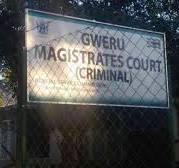By Dumisani Ndlovu
Barely a month after benefiting from a Presidential amnesty rolled out recently, a habitual house breaker has been slapped with a 2-year jail term over unlawful entry and theft case in which he stole a laptop worth US$300.
The young habitual offender, Charles Madzure, 20, from Woodlands, who was convicted on his own plea of guilty on all the two counts by Gweru Magistrate Beaulity Dube is back inside Hwahwa prison walls.
Madzure was convicted and sentenced of unlawful entry a house at KMB, Senga in Gweru on 13 May 2024 where he stole a laptop before making his escape.
Although the accused was sentenced to two years, he will, however, serve an effective 3 years’ jail stint after a previous criminal record of a suspended 12-month sentence show up on criminal record checks by disclosure of previous conviction.
Public Prosecutor Christine Shoniwa told the court that on count one, on 13 May 2024, Charles Madzure unlawfully entered Ashley Munyonyo’s house.
“On count two after unlawfully entering the house, you stole a Dell laptop worth US$300 which was left on the bed. The laptop was recovered. You acted unlawful, as you wanted to prejudice the owner of his property,” said the Prosecutor.
Madzure who told the court was a beneficiary of the Presidential amnesty, pardoned in April 2024 was convicted of unlawful entry into premise as defined in section 131(1) (a) as read with section 131(2) (e) of the Criminal Law Codification and Reform Act chapter 9:23.
The proactive and interactive prosecutor, Shoniwa prayed for a deterrent sentence since the accused was not a first offender.
“Your worship the accused in not a first offender, he once committed a similar offence under case number 135/2023 where he was convicted on 1 June 2023.On the case he was sentenced to 36 months in prison of which 12 months were suspended on conditions that he does not commit similar offence in the next five years”
“It shows that he is a habitual criminal and has not reform, hence a stiffer sentence can deter him from committing crimes. What is aggravating is that the offence was premeditated, he carefully planned the crime. The fact that the property was recovered does not lessen the crime. He has not reformed as evidenced by this certificate of previous conviction. The accused must be sentenced for a long time so that people have trust on the judiciary,” said prosecutor Shoniwa.
On his mitigation, the accused requested for lenience claiming he was pursuing his Ordinary Level studies which he said started during his previous sentence at Hwahwa Prison and is set to write examinations in November 2024.
“I beg for lenience since I am supposed to write my Ordinary Level in Novembers, I am supposed to submit my CALAs,” said Madzure.
In passing the sentence, Magistrate Dube said she considered that the accused was not a first offender.
“The fact that you are a repeat offender indicates your failure to learn from past transgressions and your continued disregard for the law shows that the previous sentence was not deterrent enough to make you reform, hence you need a longer sentence that will rehabilitate you. I however considered that you pleaded guilty, you did not waste the court’s time. For your academic studies you will go back at Hwahwa where you started you school so that you finish” said Magistrate Dube.
She said a longer sentence will make the accused respect other people’s properties and not evade other people’s privacy.
“Being not the first offender makes your case more aggravating, hence an enhanced penalty, or a longer prison sentence is the only way that can make you reform. You don’t have respect to other people’s properties and you evade other people’s privacy. For the purpose of sentencing, I will treat both counts as one. For the above reasons I therefore find the following sentence appropriate: 2 years in prison in addition 12 month from your previous suspended sentence, “Magistrate Dube ruled.


